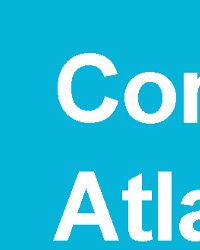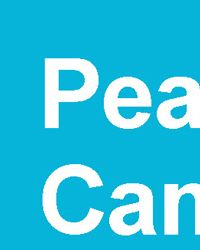Real Communities
Filling in the Gaps
Inspire Positivity!
GREEN
Peacebuilders Camp
Georgians For Alternatives to the Death Penalty (GFADP)

Who We Are: Georgians for Alternatives to the Death Penalty (GFADP) is the statewide coalition of organizations and individuals working to end capital punishment in Georgia and around the world. By working in partnership with the Georgia Council on Developmental Disabilities (GCDD) Real Communities, GFADP also seeks protect the rights and dignity of those on death row while ensuring the protection of individuals with developmental disabilities from unjust application of death penalty laws.
In January 2015, the State of Georgia executed Warren Hill, a 52-year-old man with an intellectual disability. Despite undisputed testimony from the State’s experts, Warren faced execution because of Georgia’s incredibly high burden of proof for defendants with intellectual disability. His case highlights the ways in which people with developmental and intellectual disabilities are railroaded by the criminal legal system every day.
As a result of Warren’s case, GFADP and GCDD came together to explore ways to stop the execution of individuals with intellectual disabilities in Georgia and deepen our collective understanding of how mass incarceration and the criminal justice system uniquely impact people with disabilities. GFADP is working to create local alliances coalitions in three key communities around the state (Atlanta, Dawson, and a third location to be determined) that come together to focus on a local problem.
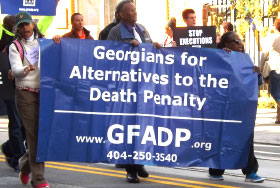 Marching in the annual MLK parade to promote GFADP
Marching in the annual MLK parade to promote GFADP 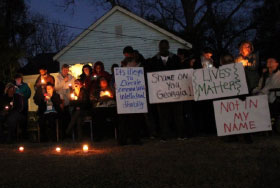 Vigil to stop the execution of Warren Lee Hill in Georgia
Vigil to stop the execution of Warren Lee Hill in Georgia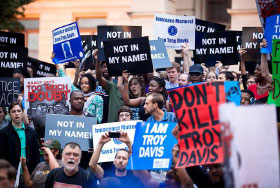 Commemorating the execution of Troy Davis
Commemorating the execution of Troy DavisWhat We Do: GFADP is an organization that is working to actively form alliances by engaging other organizations and leaders both in and out of the anti-death penalty network. GFADP has collaborated with GCDD to work to change the standard of proof for proving intellectual disability in death penalty cases. We worked diligently to educate people within and outside of the disability community about why this is an important movement. Our efforts paid off, and SB 401 was introduced in the Georgia State Senate by Senator Elena Parent. This bill will change the standard of proof placed on individuals with intellectual disabilities in death penalty cases in Georgia from, "Beyond a Reasonable Doubt." to "Preponderance of the Evidence.”
Read the legislation here: http://www.legis.ga.gov/legislation/en-US/Display/20152016/SB/401
GFADP was also incorporated in the GCDD-organized 2015 Social Justice Summit where it made new connections and networking opportunities for future organizing work. Similarly, GFADP has been involved in related conversations with the NAACP. As this country is facing overwhelming occurrences of the shooting of unarmed black and brown people and mass incarceration, GFADP attempts to illustrate the connection between the death penalty and the African-American community.
GFADP aims to bringing a more diverse perspective to the death penalty work and they will continue to fight to abolish the death penalty in the state of Georgia. This organization strives to be a major part of reforming the criminal justice system. By building a stronger community, GFADP will be able to end the death penalty, and usher this nation towards the criminal justice reform movement.

Click here to visit our website.
In the News: Columbus NAACP hosts vigil in protest of execution, World Now, 1/27/15 Click here to read article.
Women on the Rise

Who We Are: Women on the Rise, a group formed by formerly incarcerated women, works to demand justice, dignity, and liberation for all through collective action that transforms communities and builds public safety by creating strong, interdependent communities. Through support provided by the Georgia Council on Developmental Disabilities' Real Communities Initiative, WOTR also seeks to also ensure that equal justice is received by individuals with developmental disabilities ensnared in the criminal justice system.
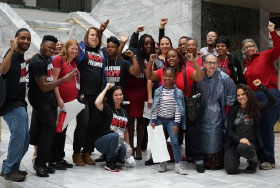 Advocates turn out for Atlanta Public Safety hearing to call for "Solutions Not Punishment."
Advocates turn out for Atlanta Public Safety hearing to call for "Solutions Not Punishment."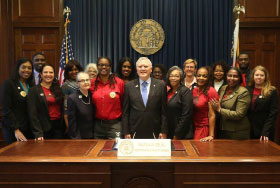 Georgia Governor Nathan Deal signs executive order to "Ban the Box."
Georgia Governor Nathan Deal signs executive order to "Ban the Box."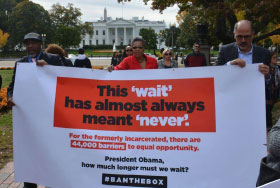 Advocating before the White House to "Ban the Box"
Advocating before the White House to "Ban the Box"What We Do: Women on the Rise hosts regular Transformative Leadership Development and Community Building gatherings and Strategy Sessions. In 2014, they ran a successful internship program for formerly incarcerated women, conducted street and organizational outreach, engaged leaders in an intensive somatic leadership development program, and won important policy victories which impact the lives of thousands of formerly incarcerated people in Georgia when they successfully ‘Banned the Box’ on job applications in Fulton County, Atlanta, East Point and the State of Georgia. These efforts have benefited those targeted by the criminal legal system, institutionalized and kept from receiving much needed services to integrate them into the community. They have built a strong core group of leaders who are routinely engaging in community outreach and campaign actions in the Atlanta Metro area.
Women on the Rise, the Racial Justice Action Center, and SNaP Co (Solutions Not Punishment Coalition) have been working towards creating a Disability Justice Committee that actively deepens their understanding of disability justice. They are crafting outreach and recruitment activities that address the reality that, similarly to formerly incarcerated people, people with developmental disabilities may often be isolated, discouraged from attending community building events, or even physically segregated by institutions. They hope to build stronger relationships with potential allies and build bridges within agencies and coalitions that focus on developmental disabilities, so they are better able to identify, engage and create a safe environment for people with developmental disabilities in their organization.
Click here to visit our web page.
For additional info: Racial Justice Action Center
City of Milton Better Together
The City of Milton is located in North Fulton County in the metro Atlanta area. Milton is a new city, formed at the end of 2006. Since its inception, the City of Milton has been extremely dedicated and intentional in ensuring accessibility and providing opportunities to involve residents with disabilities. When the city was founded, the Milton Disability Awareness Committee (MDAC) was created as an official committee of the city council. MDAC has worked with city personnel to ensure they are familiar with the Americans with Disabilities Act, have a basic level of awareness of issues impacting people with disabilities and have also worked to reach out and educate the larger community. The Georgia Council on Developmental Disabilities is currently working with MDAC and the City of Milton as part of Real Communities to ensure Milton is truly welcoming to all who live there and to provide opportunities for citizen engagement and involvement in community.
The City of Milton is currently working to develop a mini-grant program called Better Together that would be administered by the City of Milton. The purpose of these mini-grants is to provide neighborhood groups and residents with resources to create community-driven projects that enhance and strengthen local community life, build avenues towards civic engagement and create avenues for the full participation of all residents, specifically those typically left out of community life. All projects are initiated, planned and implemented by local residents. Mini-grants support neighborhood improvements, promote neighborhood associations and fund projects that bring community members together and create avenues for inclusion. Engaged and connected residents are the greatest asset in any given community. By allowing residents to actively engage in improving their communities and making them more welcoming for everyone, we see great things emerge and a new relationship develop between residents and local government. Additionally, Milton's Community Builder has been working hard to develop a citizen-led group to build relationships and use Asset Based Community Development to improve the City of Milton for everyone who lives there. To see a video of how the City of Milton's Better Together project promotes welcoming communities for all, Click here.
Gwinnett Gives TimeBank
The Gwinnett Gives TimeBank, which promotes equality and builds caring community economies through inclusive exchange of time and talent, was started by a group of parents who all have children with disabilities. The group's initial interest was focused on exploring human service co-operatives, life sharing and other alternative arrangements that allow adults with developmental disabilities to live and participate in integrated community settings. As part of the Real Communities Initiative, GCDD helped them launch the first TimeBank in the metro area of Georgia in 2012. For more information about TimeBanks, visit, www.timebanks.org.
City of Fitzgerald
Located in south central Georgia, Fitzgerald and the surrounding Ben Hill County area is a small rural community. In 2008, Ben Hill County had a poverty rate of 23.2%. Locally, residents had been organizing around the issue of transportation for nearly two years, before starting to work with the Georgia Council on Developmental Disabilities as part of Real Communities in 2009. In Fitzgerald and Ben Hill County, there were very few options for transportation outside of privately owned vehicles, which greatly limited the opportunities for recreation and social activities, medical access, educational and employment opportunities and even many everyday errands. Additionally, due to the poor transportation, an individual using a wheelchair was killed by a motorist while trying to travel on a street with no sidewalks. Transportation impacts all who live in an area, regardless of disability. As part of its Real Communities Initiative, in July 2010, Ben Hill County and the City of Fitzgerald successfully passed a Special-Purpose Local-Option Sales Tax (SPLOST), which included $250,000 specifically earmarked to provide seed funding for a small-scale public transportation system.
